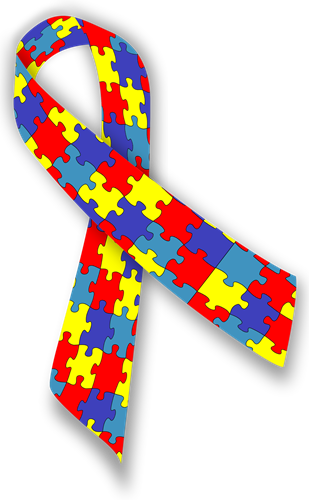I wasn’t entirely sure if I wanted to write this but suddenly, one night, a friend posed the question: ‘Your autism doesn’t actually affect you though, does it?’ That made up my mind.
It was a moment which struck me back a little; a moment which made me realise something. If the person I have lived with throughout my three years at UCFB does not understand how one can be affected by autism, then how can anybody?
To be fair to him, it is something hard to understand. I reckon a person will only truly grasp the concept of autism if 1) they have it, or 2), they hear the experiences of somebody with it. So, I’m going to share my experience with you. I am 20 years old, and at the age of eight I was diagnosed with Asperger’s Syndrome – a form of high functioning autism.

I can’t seem to recall too much of my diagnosis. I remember some of the tests I was made to do like judging facial expressions, while I can recall one conversation with my mum where I asked her why I was attending all these different appointments. It was at that point when she told me. But even then I was still none-the-wiser and could not understand how, of all the people, I was the one to have this strange thing called autism.
It’s only looking back that I realise I wasn’t a ‘normal’ child by any stretch of the imagination – although I challenge anybody to define what ‘normal’ is. I didn’t speak my first word until the age of four, while I had certain rituals which almost dictated the way I lived my life. I felt like I had to eat three meals and four snacks per day; I would always keep old food wrappers in my Mike Wazowski bag; and each weekend I wrote down every football score.
It was like I was in my own little world, with my old notepads at the centre of it. Often someone would try to talk to me but their words would go straight over my head. As much as I would like to say I’ve fully overcome that difficulty, it’s still a struggle I sometimes have. My friends say I have selective hearing and at times it angers them, but when in conversation with various people I sometimes lose track and switch off because I am unable to process everything that is being said.
It was the same in school and the same now in lectures because two hours of non-stop listening is difficult. It is difficult for the average person, yet even more so for those with autism. The irony here, though, is clear to see. As a journalism student one of my main roles is interviewing people, yet for some reason when I am in work mode I can easily overcome this difficulty.
Maybe that’s because heading into each interview I have a clear structure and I know what I want to achieve. I like having a structure and it all comes back to the rituals I had as a child. Although since coming to UCFB I have become less reliant on rituals, I still like them. I like the stability that they bring. At the start of a week, I like to know what meal I am going to cook each evening; I also like to know what work I am going to do and on which day.
It allows me to be in control of the situation and complete every task I have set myself to its maximum efficiency. My mates often frown upon the fact that all I do during the day is work but it’s something I feel I have to do, otherwise I suddenly lose control of my own situation. Although the sports industry is one where any task could crop up at any moment, that is something I am okay with; if anything I relish in it because that is not in my power so whatever will be, will be. As long as I am on top of the things in my own control, then I am okay.
World Autism Awareness Week
— Matt Adamson (@AdamsonMatt) March 29, 2021
29 March - 4 April 2021
You can find out how you can help and show support by visiting @Autism https://t.co/8oduRD4Sle #autismawareness #autism pic.twitter.com/pEGS9ZSewb pic.twitter.com/L5arKftJ4B
Autism does have its pros. But, of course, it is very challenging. The process of change and confusion is often difficult. If I were to look back at my three years at UCFB and identify my most difficult time, there is only one answer. At the start of second year, I had just broken up with my ex-girlfriend and she refused to tell me why. It took eight months for me to find out and the time in between the break-up and me finding out was horrid. It was all simply too much for me to process.
How can it be that two people suddenly go from being extremely close to one another to no longer speaking, all because something had happened in the past which did not involve me? It was only once she told me the issue that I could start the process of letting go, but it took an awfully long time for that to happen. The first semester of second year was a time where my grades dipped to a new low, and I can only put it down to what was going on with her – I just was not in the right frame of mind for anything!
It’s hard to describe how I felt at the time, maybe confusion is one word to use. Yet I think confusion is something the autistic brain finds most challenging. We like to know the ins-and-outs of each situation, and it is a massive help if something is black and white. I have slow processing skills; it is why I receive extra time in exams, so that situation with my ex-girlfriend was far too much for my brain.
There is a scene in Netflix’s Atypical (fantastic series, I highly recommend!), where the main character Sam, who has autism, goes into meltdown after he was unable to process a certain situation. For me personally it was not a nice scene to watch. Sam’s response to his situation is one I knew too well as a young teenager; all I could do was sympathise with him. But people need to realise that what happened with Sam in that scene is common for somebody with autism, and it does not mean that there is something wrong with us.
Growing up, in the aftermath of a meltdown, my family would suggest the idea of starting anger management sessions. I can’t thank my parents enough for how they have been with my autism, but in those situations did they ever think the problem was actually far deeper than an inability to cope with anger? Maybe there was an issue with my surroundings, or again, something else was going on that I found difficult to process.
Surroundings are something I find myself to be overly sensitive to. On my first day at UCFB I remember analysing each new flatmate I was going to live with in detail. In unfamiliar situations, I find myself to have heightened senses and sometimes it’ll make things more difficult than they need to be. To begin with, I may have trouble socialising with a new person or group but once I am comfortable in those surroundings, I find myself flourishing. It’s just about settling in and finding my strengths.
Doing such a thing is something I have been able to do since coming to UCFB. These three years have made me more independent than ever, and that has done my autism the world of good. Nowadays, I love attending music festivals or nightclubs where the music is loud but I could not have imagined doing such a thing as a youngster. In the past my brothers would tease me for wanting music turned down because it wasn’t nice on my ears. That sounds like a weird reason, but it was just who I was at the time. I really have come a long way since then.
In a way, I am lucky. My parents would not let my autism define who I am. That, I believe, is what has allowed me to flourish and overcome situations I once found particularly challenging. Obviously, autism still affects me in day-to-day life but not as much as it used to. Although I love attending festivals, I am still picky with my music because genres like heavy metal is just unnecessary noise to me. I still act in certain ways which people sometimes frown upon, but that is just who I am.
At the end of the day, it’s about education. Not once in my school were we ever taught about autism, or other learning disabilities, so I can’t expect people to know how it affects me. Autism is a part of who I am; it has its challenges but so does everything. Considering I am about to graduate and go work in my dream industry full-time, anybody can do anything if you put your mind to it – regardless of what disabilities you may have.
Click here to read more student blogs dedicated to World Autism Awareness Week.

















